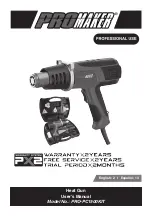
CAUTION:
Be sure the tool frame is securely supported and cannot be tipped over
during this installation procedure. An additional person should support and
stabilize the frame at all times during the installation.
1. Position the stop bar in the bottom left side of the frame as shown in Figure 40, resting against the bottom
horizontal arm and the vertical back supports.
Stop Bar
Figure 40: Installing the Stop Bar
2. Working from the front of the tool, attach the three angle supports (Figure 41) to the back of the Stop Bar,
using six 5/16 x 3/4” hex-head cap screws and nuts. Tighten the nuts securely.
Use as tempolate
to drill 7/32” holes.
Angle Support
Stop Bar
Figure 41: Installing the Stop Bar
(viewed from the rear)
3. Push the stop bar housing as far toward the center of the tool as possible.
4. Working from the back of the machine, use the angle supports as templates to drill six 7/32” holes (two per
bracket) in the horizontal tubes of the frame.
5. Insert and tighten six self-tapping 1/4-20 hex-head screws to secure the angle support brackets to the frame
tubes.
6. Measure out from the blade or bit, and adjust the stop bar ruler by sliding it left or right inside its aluminum
extension.
Operation
Set the individual flip stops to the positions desired for repetitive cuts: loosen the collars with the provided Allen
wrench, slide the collars to the desired position, and retighten them.
Multiple cuts can be made by flipping the stops up or down to position the workpiece at the proper distance from
the blade or bit. When setting multiple stops, remember to account for the material lost to the blade kerf.
Quick Stop
The Quick Stop Accessory provides an easy method of setting an exact repeatable cut length for crosscuts and
vertical routing cuts. It consists of an aluminum angle extrusion with movable tape measure, a large aluminum
stop block with threaded lock knob, and mounting brackets and screws. The Quick Stop can be attached to any
horizontal frame member, on any model saw. Standard Quick Stops are factory-drilled to mount on the left side
of the frame; right-hand Quick Stops are available by special order.
It is standard on the Models 7400 and 7400XL, and is not available for the Model TR-2.
38






































